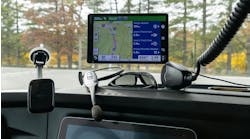PHOENIX—As Tom McLeod said in his opening statement at McLeod Software's 2023 User Conference, "When things are stable and when you can count on stability, it's a great time to get things done. It's a wonderful time to work on your business and to be prepared for when stronger growth comes back."
The McLeod User Conference was focused on just that—improving fleet businesses and optimizing operations. Sometimes, optimizing operations requires restructuring an entire fleet management software platform due to software "sundowning" or systems that don't operate with the cloud or capture data efficiently. During the conference, two representatives from fleets shared their experiences switching fleet management software from older systems to Isaac Instruments.
See also: McLeod rolls out new offerings to improve workflow
Isaac Instruments is a fleet management solutions provider focusing on in-cab technology that supports informed decision-making through its data capture. Isaac's cloud-based platform informs fleet managers and dispatchers, and an in-cab tablet walks drivers through tasks.
The case for change
Byron Trantham, co-owner and co-founder of Tranco Logistics, and Jake Von Feldt, director of finance with Don Hummer Trucking, shared their experience with the Isaac system.
Trantham said Tranco Logistics was forced to reevaluate its operations a few years ago when the company's previous fleet management provider's equipment was "sundowning" due to the 3G network sunset. The sunset would have required the company to replace roughly 80% of its fleet's management equipment, which would have resulted in an immense expense. Trantham said decision-makers then began thinking about other options available in the marketplace. Tranco ultimately chose Isaac because of the system's benefits and how it works with drivers.
Von Feldt had a similar story. Don Hummer Trucking was running about 325 trucks on a legacy platform. He shared the importance of upgrading equipment to something that was supported by the cloud. The transition to Isaac Instruments' platform is in progress at Don Hummer Trucking; Von Feldt said there are about 60 trucks that have the platform implemented, and the process is "looking really good so far."
Blueprint process
Both speakers mentioned a planning session that took place before they rolled out Isaac, which was referred to as a Blueprint Process. This session involved decision-makers in the fleets as well as experts from Isaac Instruments. The parties discussed expectations, needs, desires, operational differences between the cloud and the tablet, and ways of implementation. Some time later, another meeting took place to nail down the details. The space between these meetings allowed the fleet managers time to "sleep on it" and adjust the plan if necessary.
“Probably, easily 99.5% of the planning was done before anybody came on-site,” Tratham said.
Von Feldt said the first blueprint session resulted in asking the question, "Does this satisfy 80% of the business?" And asking that question allowed the team to make changes to the plan before implementation. This process eliminated trial-and-error in-field testing and supported a smooth transition from one system to the next for managers, dispatchers, and drivers.
Implementing Isaac
The Blueprint Process laid the foundation for the companies' Isaac integration into the fleets, and Trantham and Von Feldt had high praise for the implementation process.
Trantham admitted that throughout the process, he was waiting for something to go wrong. He said the week leading up to the implementation, the Isaac team was working through workflows, working with drivers, and ensuring everything was functioning as normal, "and I'm waiting for just something to break … and it never happened."
Von Feldt said the implementation for Don Hummer Trucking has been "incredibly smooth" because of the consistent communication with the Isaac team. He said they can send drivers "out in the world with comfort and confidence" because when drivers have questions, they know they're going to get help from the Isaac team. Drivers are "not out there with too much change all at once," Von Feldt explained.
Driver experience
Because drivers are the ones using the system to guide them through workflows via the in-cab tablet, Trantham said the driver experience was important to them. Although the Isaac platform places driver reliance on the tablet, the company stresses that this system isn't meant to distract drivers—in fact, the tablet screen locks when the truck is in motion—instead, the system is intended to walk drivers through operations step by step.
One example Trantham mentioned was the auto arrival in the Isaac system that automatically displays on the tablet screen when the driver uses the handbrake, along with eliminating going back and forth from the tablet home screen to other apps to perform basic functions. Trantham said that was a "definite benefit" for Tranco because it's "easy on the driver, it's easier to workload."
Von Feldt said in the past, Don Hummer Trucking experienced hardware that was outdated and unreliable, and he hasn't seen that with Isaac. Additionally, Don Hummer Trucking is now in the "workflow world," Von Feldt said. "We're integrated, we're less button-push, there's less data handling."
Other benefits
Because of Isaac's integration with McLeod, Trantham said Tranco's dispatch team also sees benefits. "Most all the data comes into McLeod, and they can see a lot of their driver availability," Trantham explained. "Dispatchers will keep the Isaac portal open on one of their monitors" because the portal allows them to see items such as a driver's available hours of service and a driver's location.
Additionally, Isaac allows dispatchers and driver managers to remote into a driver's tablet to help them solve problems. Trantham said that during the implementation phase, drivers and managers used this function often as they acclimated to the system.
See also: How a unified front can help recruit, retain drivers
For fleet managers looking for a management solution that streamlines their workflow, Isaac brings quite a bit to the table because the platform brings together functions that, before, might have required four or five vendors to produce. With Isaac, a driver's job is simplified, and fleet managers, dispatchers, and drivers can all be on the same page.




